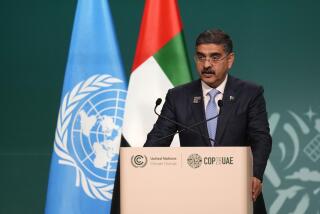2 U.S. troops among Pakistan dead
- Share via
ISLAMABAD, PAKISTAN — Pakistani investigators combed through the charred wreckage of the Marriott Hotel here Sunday in search of clues to who was behind a suicide truck bombing that killed at least 53 people, including two members of the U.S. military.
No group had claimed responsibility yet for Saturday’s attack, but authorities said their investigation was focusing on militant tribal groups known as the Pakistani Taliban.
“All roads lead to Waziristan,” said Rehman Malik, the top official in the Interior Ministry, referring to mountainous militant strongholds in the country’s northwest that have come under attack by the Pakistani army.
In Washington, the Department of Defense said that two service members assigned to the U.S. Embassy in Islamabad, the capital, had died of injuries received in the attack on the hotel. Their names were withheld pending notification of their families.
U.S. Embassy spokesman Lou Fintor said a State Department contractor remained missing after the blast.
The dead also included Czech Ambassador Ivo Zdarek.
The high-profile attack was the latest reminder of a rise in militancy in Pakistan, despite billions of dollars in U.S. support to the country since 2001. Pakistan witnessed nearly 60 suicide bombings in the last year, including one that killed former Prime Minister Benazir Bhutto in December.
Government officials released surveillance video of the moments leading up to the blast at the five-star, American-branded hotel about 8 p.m. Saturday.
The dramatic video shows an explosives-laden truck ramming the security gate about 60 feet from the hotel and bursting into flames. Hotel guards, apparently unaware that the truck still contained an estimated 1,300 pounds of military-grade explosives, TNT and aluminum powder, gathered around, appearing uncertain of what to do. One guard attempted to douse the flames with a fire extinguisher.
The video ends before the second, much-larger explosion devastated the landmark hotel, which is frequented by diplomats and visitors as well as Pakistani elite. The blast triggered a fire that raced through the hotel, which was still smoldering Sunday evening.
Four Americans were among the 266 people injured in the blast. The majority of the casualties were Pakistanis.
The U.S. government has offered to assist Pakistani authorities in the investigation.
Some analysts said the attack appeared to reflect anti-government sentiment rather than anger toward the United States, noting that it came just hours after new President Asif Ali Zardari’s first address to parliament and during the iftar meal at the Marriott, where a large number of Pakistani political and business leaders probably would be in attendance. The iftar meal ends the daily fast during the Muslim holy month of Ramadan.
“It was well thought through,” said Shuja Nawaz, a Pakistani who is a former International Monetary Fund official and author. “They are threatening the integrity of Pakistan now. This is not an anti-American action now. These are people attacking Pakistani institutions inside the heartland of Pakistan.”
Malik, the Interior Ministry official, said the attack was an attempt to undermine the country’s government. “Our enemies don’t want to see democracy flourishing in the country,” he said.
Rep. Mark Kirk (R-Ill.), who has traveled to the tribal areas more than any other congressman, said the bombing could backfire.
“A direct attack on a new elected civilian government is a direct attack on the middle class of Pakistan,” and could increase public support for sending troops to the tribal areas, Kirk said.
Prime Minister Yusaf Raza Gilani said Sunday that his house, less than a mile from the hotel, was the original target of the attack, but that terrorists were unable to penetrate the security around it.
Analysts said they would be watching to see how Pakistan’s armed forces and fledgling government would respond. The blast raises the stakes for Zardari, Bhutto’s widower.
Over the last 18 months, militants have shifted their war from Pakistan’s mountainous tribal areas into the heart of the nation’s well-guarded capital. Other recent attacks have targeted the Danish Embassy, government buildings and a munitions factory just outside Islamabad.
Terrorism expert Bruce Hoffman of Georgetown University said the new government has appeared, at times, to buckle in the face of attack. Following the August suicide bombing that killed 67 people at the weapons facility in Wah, militants threatened more strikes unless the government halted a military campaign in the Bajaur region of northwestern Pakistan. A week later, the government announced a cease-fire, citing Ramadan.
“Militants have already bombed their way to success and intimidated the government and military into making deals,” Hoffman said. “I guess they thought it was time for another dose of intimidation.”
He said Pakistan should reevaluate its controversial policy of negotiating truces with some tribal leaders, including a few with links to terrorists.
The United States has been pressuring Pakistan to crack down militarily. In recent months, U.S. forces operating in Afghanistan have launched a series of cross-border attacks into Pakistan in pursuit of suspected Al Qaeda fighters and leaders. Pakistani officials have complained that such attacks violate their country’s sovereignty.
Gilani defended the government’s military strategy, saying it will continue to attack groups that use terrorist tactics against civilians but negotiate with militants who agree to disarm. He also said the government would focus on reducing poverty and illiteracy in the volatile tribal areas, which he blamed for fueling extremism.
Public opinion in Pakistan has been strongly opposed to U.S. involvement and confrontations with militants. Polls show most Pakistanis blame their country’s growing violence on the government’s relationship with the U.S.
--
Times staff writer Sanders reported from Nairobi, Kenya, and special correspondent Zaidi from Islamabad. Times staff writer Josh Meyer in Guantanamo Bay, Cuba, contributed to this report.
More to Read
Sign up for Essential California
The most important California stories and recommendations in your inbox every morning.
You may occasionally receive promotional content from the Los Angeles Times.













